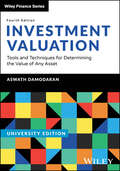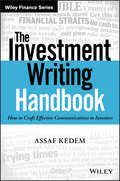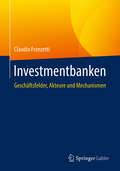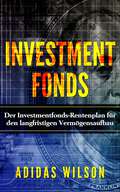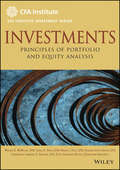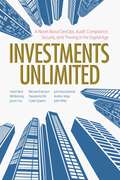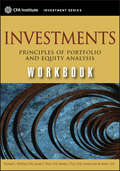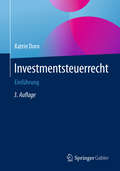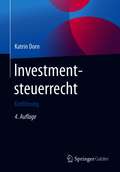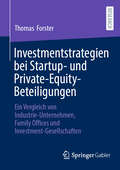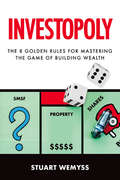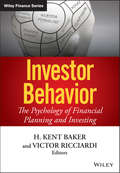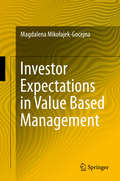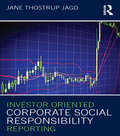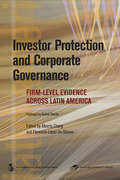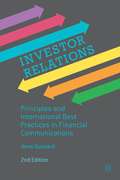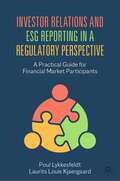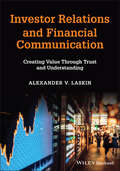- Table View
- List View
Investment Valuation, University Edition: Tools and Techniques for Determining the Value of any Asset
by Aswath DamodaranUpdated edition of the definitive guide to investment valuation tools and techniques Investment Valuation: Tools and Techniques for Determining the Value of Any Asset delves into valuation techniques for a variety of different asset classes, including real options, start-up firms, unconventional assets, distressed companies and private equity, real estate, and many more, and explains how to choose the right model for any given asset valuation scenario. The models are presented with real-world examples so as to capture some of the problems inherent in applying these models, with discussion of differences and common elements between the models to provide readers with a holistic understanding of the subject matter. Written by a professor of finance who is widely regarded as one of the best educators and thinkers on the topic of investment valuation, this newly revised and updated Fourth Edition explores topics including: Understanding financial statements, the basics of risk, and tests and evidence for market efficiency Estimating risk parameters and costs of financing, terminal value, and equity value per share Using scenario analysis, decision trees, and simulations for probabilistic approaches in valuation Investment Valuation: Tools and Techniques for Determining the Value of Any Asset is an essential resource for all investors and students of financial markets seeking an all-in-one guide to expand their valuation knowledge and make better investment decisions.
The Investment Writing Handbook: How to Craft Effective Communications to Investors (Wiley Finance)
by Assaf KedemThe writing "bible" for financial professionals The Investment Writing Handbook provides practical, accessible guidance for crafting more effective investor communications. Written by an award-winning writer, editor, and speechwriter, this book explains the principles and conventions that help writing achieve its purpose; whether you need to inform, educate, persuade, or motivate, you'll become better-equipped to develop a broad range of communications and literature for investor consumption. Examples from real-world financial institutions illustrate expert execution, while explanations and advice targeted specifically toward investor relations give you the help you need quickly. From white papers and investment commentary to RFPs, product literature, and beyond, this book is the financial writer's "bible" that you should keep within arm's reach. Investment writing is one of the primary influences on investors' attitudes. It educates, informs decisions, shapes opinions, and drives behavior—so shouldn't it be expertly-crafted to achieve its intended goal? This book explains the "tricks of the trade" to help you get your message across. Understand the principles of effective investor communication Master the conventions of informative and persuasive writing Examine well-written sample documents from real-world institutions Improve research papers, presentations, investor letters, marketing literature, and more Virtually all firms with investors as clients need to communicate to them regularly, but few financial professionals receive formal training in investor communications. When investors' opinions, attitudes, and actions determine the health of your company, it is vitally important that these communications not be left to chance. The Investment Writing Handbook provides essential guidance and clear explanations to help you transform your communication strategy, execution, and results.
Investmentbanken: Geschäftsfelder, Akteure Und Mechanismen
by Claudio FranzettiDieses Buch beschreibt die aktuellen Tätigkeiten der Investmentbanken, wobei die zehn größten als Referenzpunkte dienen. Bevor der Leser oder die Leserin ins Thema der Aktivitäten einsteigt, wird eine kurze Einführung in die Grundlagen gegeben. Es werden die wesentlichen Produkte, Akteure und Mechanismen dargestellt. Damit wird sichergestellt, dass auch der nicht allzu kundige das Thema bewältigen kann. Die Gliederung folgt den großen Themen von Investment Banking und Sales & Trade, die dann mit den weiteren Dienstleistungen angereichert werden. Traditionelle Geschäftsfelder anderer Marktteilnehmer, wie etwa Vermögensverwaltung, werden nicht sehr detailliert besprochen. Denn es liegt bereits eine unübersehbare Anzahl von Angeboten vor. Das Buch schließt mit einem Ausblick, der nur vorsichtig formuliert werden kann. Dennoch ist absehbar, dass die Investmentbanken eine Symbiose mit Fintechs und einen Übergang in neue Strukturen vollziehen werden.
Investmentfonds: Der Investmentfonds-Rentenplan für den langfristigen Vermögensaufbau
by Adidas WilsonInvestmentfonds sind bei Anlegern sehr beliebt und leicht zu verstehen. Sie bieten Anlegern mit wenig Geld, Zeit oder Wissen Vorteile und Einfachheit. Wenn Sie noch unschlüssig sind, ob Investmentfonds für Sie geeignet sind, sollten Sie sich diese Vorteile ansehen. Die Diversifizierung von Vermögenswerten ist für Klein- und Großanleger eine der wichtigsten Regeln für Investitionen. Unter Diversifizierung versteht man die Kombination verschiedener Arten von Anlageklassen und Investitionen innerhalb eines Portfolios. Sie hilft bei der Risikosteuerung. Für ein diversifiziertes Portfolio ist es ratsam, Aktien mit unterschiedlicher Kapitalisierung aus verschiedenen Branchen sowie Anleihen mit unterschiedlichen Laufzeiten von verschiedenen Emittenten zu kaufen. Diese Strategie kann für einen einzelnen Anleger kostspielig sein. Wenn Sie Investmentfonds kaufen, haben Sie den Vorteil einer sofortigen Vermögensallokation und Diversifizierung ohne die hohen Kosten, die Sie bei der Erstellung individueller Portfolios hätten. Der Nachteil dabei ist, dass ein einzelner Investmentfonds möglicherweise keine ausreichende Diversifizierung bietet. Prüfen Sie, ob der Fonds branchen- oder sektorspezifisch ist. Wenn Sie zum Beispiel in einen bestimmten Sektor investieren, können Sie Ihr Geld auf mehrere Unternehmen verteilen. Wenn dieser Sektor jedoch fällt, kann Ihre Anlage darunter leiden. Um Größenvorteile einfach und schnell zu verstehen, denken Sie an Mengenrabatte: Je mehr Sie von einem Artikel kaufen, desto billiger wird er. Das Gleiche gilt für den Kauf und Verkauf von Wertpapieren. Wenn Sie ein einzelnes Wertpapier zu einem bestimmten Zeitpunkt kaufen, zahlen Sie höhere Transaktionsgebühren. Investmentfonds senken die Transaktionskosten für ihre Anleger, indem sie sich das Verkaufs- und Kaufvolumen zunutze machen.
Investments
by Gerhard Van de Venter Michael G. Mcmillan Wendy Pirie Jerald E. Pinto Lawrence E. Kochard CFAA comprehensive guide to investment analysis and portfolio management by an expert team from the CFA InstituteIn a world of specialization, no other profession likely requires such broad, yet in-depth knowledge than that of financial analyst. Financial analysts must not only possess a broad understanding of the financial markets-including structure, organization, efficiency, portfolio management, risk and return, and planning and construction-but they must also have a strong sense of how to evaluate industries and companies prior to engaging in an analysis of a specific stock. Investments: Principles of Portfolio and Equity Analysis provides the broad-based knowledge professionals and students of the markets need to manage money and maximize return. The bookDetails market structure and functions, market anomalies, secondary market basics, and regulationDescribes investment assets and asset classes, types of positions and orders, as well as forecasting methodologiesDiscusses return and risk characteristics, portfolio diversification and management, the basics of both technical analysis and major technical indicators, and much moreA companion Workbook, which includes learning outcomes, summary overviews, and problems and solutions sections is available and sold separatelyInvestments provides readers unparalleled access to the best in professional quality information on investment analysis and portfolio management.
Investments: An Introduction
by Herbert B. MayoMayo's INVESTMENTS: AN INTRODUCTION, 12E allows you to fully understand today's most important investment topics from the perspective of an individual financial planner. This edition provides an inviting, comprehensive approach to investments--from the fundamentals you need for success on the CFP exam to more advanced skills for investing today. You'll learn the key points of making solid investment decisions as you gain an overview of today's most pertinent investment opportunities and challenges. An ongoing Financial Advisor's Investment Case, Internet assignments, and expanded coverage of stock valuation ratios as well as stock repurchases and dividend payments emphasize how you can apply what you're learning to daily decisions.
Investments: An Introduction, Fifth Edition
by Herbert B. MayoThis is an Intro to Investment college textbook. Some of the graphs, tables, illustrations, and picture captions are not included. Some of the text has been altered for easier computer reading.
Investments Unlimited: A Novel About DevOps, Security, Audit Compliance, and Thriving in the Digital Age
by Helen Beal Bill Bensing Jason Cox Michael Edenzon Topo Pal Caleb Queern John Rzezotarski Andres Vega John WillisSusan Jones had been the CEO of Investments Unlimited, Inc. (IUI) for five years, a financial institution that has successfully navigated their digital transformation. She is quick on her feet and is trusted by the board. But right now—although you can't tell from her demeanor—she was panicking. Today, IUI received notice from bank regulators concerning their unsatisfactory audit and compliance practices. If they failed to address the regulators' concerns within the year, the company could go up in smoke. She didn't understand. How had her team let this happen? How had she let this happen? Over the past several years, IUI had executed a digital transformation strategy following the business accelerating principles of Agile and DevOps. By any metric they had seemingly done things right. Feedback from customers was astounding and conversion rates for new accounts was growing faster than ever. But along the way IUIs manual governance process had become inundated with friction, frustration, and failure for the teams attempting to deliver value for their organizations. Now, it's all hands on deck for a cross-functional team of executives and engineers to develop a modern automated governance process that satisfies regulators without slowing the company's ability to meet customer demands and compete in the market.In the vein of bestselling titles The Phoenix Project and The Unicorn Project, Investments Unlimited helps organizations radically rethink how they handle audit, compliance, and security for their software systems. By introducing concepts, tools, and ideas to reimagine governance, this book catalyzes a more humane way to enable high-velocity software delivery that inspires trust and is inherently more secure.
Investments Workbook: Principles of Portfolio and Equity Analysis, 1st Edition
by Gerhard Van de Venter Wendy L. Pirie Michael Mcmillan Jerald E. PintoCompanion workbook to the CFA Institute's Investments: Principles of Portfolio and Equity Analysis Workbook In a world of specialization, no other profession likely requires such broad, yet in-depth knowledge than that of financial analyst. Investments: Principles of Portfolio and Equity Analysis provides the broad-based knowledge professionals and students of the markets need to manage money and maximize return. This companion Workbook, also edited by experts from the CFA Institute, allows busy professionals to gain a stronger understanding of core investment topics. The Workbook Includes learning outcomes, summaries, and problems and solutions sections for each chapter in the main book Blends theory and practice Provides access to the highest quality information on investment analysis and portfolio management With Investments: Analysis and Portfolio Management Workbook, busy professionals can reinforce what they've learned in reading Investments, while doing so at their own pace.
Investmentsteuerrecht: Einführung
by Katrin DornDieses Buch bietet eine aktuelle und praxisnahe Einführung in die komplizierte Materie des Investmentsteuerrechts, die immer mehr an Bedeutung zunimmt, denn nach jüngsten Schätzungen besitzen schon ca. 60% aller deutschen Haushalte Anteile an Investmentfonds. Der Schwerpunkt der Darstellung im Buch liegt auf der Besteuerung des Anlegers. Eine Vielzahl von Praxishinweisen und Beispielen rundet die Darstellung ab.Für die 3. Auflage wurde das Buch vollständig überarbeitet und auf den aktuellen Rechtsstand nach der Investmentsteuerreform 2018 angepasst.
Investmentsteuerrecht: Einführung
by Katrin DornDieses Buch bietet eine grundlegende und aktuelle Einführung in die komplizierte Materie des Investmentsteuerrechts. Der Schwerpunkt der Darstellung im Buch liegt auf der Besteuerung des Anlegers. Eine Vielzahl von Praxishinweisen und Beispielen rundet die Darstellung ab.Die 4. Auflage wurde vollständig aktualisiert und berücksichtigt den aktuellen Rechtsstand.
Investmentstrategien bei Startup- und Private-Equity-Beteiligungen: Ein Vergleich von Industrie-Unternehmen, Family Offices und Investment-Gesellschaften
by Thomas ForsterIn diesem Buch werden systematisch die strategisch wie operativ unterschiedlichen Herangehensweisen von Investment-Gesellschaften (im Sinne unabhängiger VC- und PE-Firmen), Industrie-Unternehmen (bzw. deren Beteiligungstöchtern) und Family Offices bei deren Startup- und Private-Equity-Beteiligungen herausgearbeitet und verglichen. Im Fokus steht dabei der deutsche Markt. Anhand von 15 Hypothesen diskutiert der Autor in seiner empirischen Untersuchung, nach welchen Kriterien die Investoren ihre Targets bewerten, wie und anhand welcher Kennzahlen sie diese nach ihrem Einstieg steuern und ob sie ihre selbstgesteckten Ziele erreichen. Dabei dienen vier Module – zum strategischen Framework, zur Strukturierung der Investments und deren Absicherung sowie zur Erfolgsbewertung des Gesamt-Portfolios – als modelltheoretische Grundlage.
Investopoly: The 8 golden rules for mastering the game of building wealth
by Stuart WemyssWinning at Monopoly requires having a little bit of luck, making the most of your luck and applying certain rules – such as buying as much property as possible, not spending all your cash (having some savings) and negotiating to get a full set of properties as soon as you can. Building wealth is no different. You can win at the game of building personal wealth by applying a set of proven rules: the 8 Golden Rules.In Investopoly, Stuart Wemyss explains the rules he has formulated and refined over two decades of practice, observation and experience. They are not just theory, they are rooted in simple maths, academic studies and/or common sense. They are tested and have been proven to work. They are the rules of the investment game. If you are looking to build wealth that will ensure you are financially secure then this is the book for you. Stuart possesses the rare skill of being able to make financial planning interesting. In this engaging and informative book, he gives sound, easy-to-understand information and encouragement to readers to help them with their planning, saving and investing for a comfortable lifestyle in retirement.
Investor Behavior
by Victor Ricciardi H. Kent BakerInvestor Behavior provides readers with a comprehensive understanding and the latest research in the area of behavioral finance and investor decision making. Blending contributions from noted academics and experienced practitioners, this 30-chapter book will provide investment professionals with insights on how to understand and manage client behavior; a framework for interpreting financial market activity; and an in-depth understanding of this important new field of investment research. The book should also be of interest to academics, investors, and students.The book will cover the major principles of investor psychology, including heuristics, bounded rationality, regret theory, mental accounting, framing, prospect theory, and loss aversion. Specific sections of the book will delve into the role of personality traits, financial therapy, retirement planning, financial coaching, and emotions in investment decisions. Other topics covered include risk perception and tolerance, asset allocation decisions under inertia and inattention bias; evidenced based financial planning, motivation and satisfaction, behavioral investment management, and neurofinance. Contributions will delve into the behavioral underpinnings of various trading and investment topics including trader psychology, stock momentum, earnings surprises, and anomalies. The final chapters of the book examine new research on socially responsible investing, mutual funds, and real estate investing from a behavioral perspective. Empirical evidence and current literature about each type of investment issue are featured. Cited research studies are presented in a straightforward manner focusing on the comprehension of study findings, rather than on the details of mathematical frameworks.
Investor Expectations in Value Based Management
by Magdalena Mikołajek-GocejnaUnderstanding the process of shaping investor expectations is essential to describe and predict changes in the value of assets on the financial markets, especially stock prices on the capital markets and thus the value of companies listed on them. The main objective of this book is to include the investor expectations in the concept of enterprise value management and measurement of shareholders value creation It seems that the role of expectations, as a determinant of investment decisions on the capital market, requires a deep insight and highlight the importance of managing the expectations for creating value for shareholders, in particular in the context of the financial crisis of 2007-2009. Creating value for shareholders is to overcome investor expectations for the rate of return on their initial investment. That means that managers must understand how investors build their expectations. According to studies conducted by T. Copeland and A. Dolgoff'a there is a strong and statistically significant relation between the shareholders returns and the two types of variables: changes in expectations for the future earnings and changes in the level of interference of provided information. Almost 50% of the variance of return rates can be explained by these two variables. Studies have also shown that changes in expectations for long-term profits have a significant and immediate impact on the share price. Readers of this book will be able to understand the process of investor expectation formulation, will know how to create value in response to investor expectations and how to consciously shape investor expectations in order to increase company value.
Investor Oriented Corporate Social Responsibility Reporting
by Jane Thostrup JagdReporting organizations' corporate social responsibility activities is difficult - a lack of regulation means that the communication of these activities varies significantly and there is a multitude of ways in which mistakes can be made. The author provides the tools and insights required to produce investor-friendly CSR reports and includes a chapter showing how the investors can integrate CSR in their quantified analysis of investment-opportunities. Features include formulas, conversion standards and CSR note tables which enable the book to be used as a practical handbook as well as in the classroom. Written by an experienced compliance officer with years of experience in reporting CSR, this book is an easy-to-follow guide for practitioners and students and will be required reading for students of accounting, financial reporting and auditing as well as those in industry who want to improve their organization's reporting standards.
Investor Protection and Corporate Governance
by Alberto Chong'Investor Protection and Corporate Governance' analyzes the impact of corporate governance on firm performance and valuation. Using unique datasets gathered at the firm-levelùthe first such data in the regionùand results from a homogeneous corporate governance questionnaire, the book examines corporate governance characteristics, ownership structures, dividend policies, and performance measures. The book's analysis reveals the very high levels of ownership and voting rights concentrations and monolithic governance structures in the largest samples of Latin American companies up to now, and new data emphasize the importance of specific characteristics of the investor protection regimes in several Latin American countries. By and large, those firms with better governance measures across several dimensions are granted higher valuations and thus lower cost of capital. This title will be useful to researchers, policy makers, government officials, and other professionals involved in corporate governance, economic policy, and business finance, law, and management.
Investor Relations
by Anne GuimardThis practical guide on the theory and practice of Investor Relations combines the art and science of marketing, financial analysis, and financial communications in a single source. It offers expert advice and helpful tips to be used in real business life by corporate executives, financial analysts, students, and anyone competing for capital.
Investor Relations and ESG Reporting in a Regulatory Perspective: A Practical Guide for Financial Market Participants
by Poul Lykkesfeldt Laurits Louis KjaergaardInvestor Relations and ESG Reporting in a Regulatory Perspective is a comprehensive and detailed practical guide for financial market participants, focusing on the stock market, written for practitioners by practitioners. The main themes of the book include the challenging integration of investor relations (IR) and the non-financial reporting of environmental, social and governance (ESG). Further, the book provides a comprehensive overview of the complex regulatory framework of the European Union (EU) related to the financial markets, including the expected global trends in this area. This includes financial legislation such as MiFID II, MiFIR and MAR along with non-financial legislation like the EU’s taxonomy, CSRD and SFDR. In addition, this book explores the non-financial reporting standards of GRI, TCFD, CDSB, IBC, SASB, IRRC and the upcoming ISSB, and discusses the UN’s Sustainable Development Goals (SDGs). In addition, the book provides a practical guide regarding IR in special situations, e.g. in connection with takeover response manuals, M&A, investor activism, initial public offerings (IPOs), as well companies’ collaboration with e.g. investment banks and corporate finance advisers, financial PR and IR advisers in such situations. The suggested audience of the book includes board members and senior management of in particular listed companies, and companies considering an IPO; professionals working in the fields of IR, ESG and communications; institutional and retail investors; private equity executives; venture capitalists; investment bankers; legal practitioners; accountants and auditors; financial journalists; and politicians. Finally, university and business students may benefit from an insight into the dynamics of the financial markets and the direction they are moving, a possible inspiration for choosing a future career.
Investor Relations and Financial Communication: Creating Value Through Trust and Understanding (Handbooks In Communication And Media Ser.)
by Alexander V. LaskinEquips students and professionals with the fundamental skills and knowledge needed to succeed in investor relations and financial communication Investor Relations and Financial Communication is a comprehensive, up-to-date introduction to the investor relations and financial communication profession. Written by a leading educator and professional consultant, this authoritative textbook provides the well-rounded foundation necessary for anyone wanting to begin a career as an Investor Relations Officer (IRO). Detailed yet accessible chapters describe all essential aspects of the field, including communication skills, basic financial knowledge, legal and regulatory guidelines, professional standards and practices, and more. Organized in five sections, the book first identifies and defines the jobs available in investor relations and financial communication, detailing the responsibilities, titles, salaries, and key players in the industry. After thoroughly explaining the disclosure of financial and non-financial information, the author describes the regulatory environment in which professionals operate and offers expert insight into issues of corporate governance, environmental sustainability, social responsibility, shareholder activism, and crisis management. Subsequent sections highlight the day-to-day activities of investor relations and financial communication professionals and discuss the future of the field. This invaluable textbook also: Describes the responsibilities of the Investor Relations Officer throughout initial public offering, periodic reporting, and performance evaluation Discusses the role of investor relations professionals in disclosing financial information and educating the investment community Emphasizes the various skills that IROs must possess in order to do their jobs successfully, such as marketing and securities law compliance Includes end-of-chapter review questions, activities, and lists of key terms Investor Relations and Financial Communication: Creating Value Through Trust and Understanding is the perfect textbook for both professional development training programs and undergraduate and graduate courses in investor relations, and is required reading for all those working in investor relations, particularly early-career professionals.
Investor Relations at TOTAL
by Vincent Dessain Gregory S. Miller Anders SjomanExamines investor relations and financial communications in a large company with a diverse group of financial stakeholders. Total is an "energy major" based in Paris, France. The importance of its product and its impact on economies and environments combine with the size of the company to make Total highly visible to investors, governments, environmental groups, and other shareholders. The highly technical nature of Total's many internal activities and the breadth of its complex operations further impacts communication efforts. In addition, as a Continental European firm (in particular, French), Total has strong societal expectations regarding its interactions with employees/citizens vs. shareholders. Examines how Total creates a consistent and clear financial communication that provides information to these diverse stakeholder bases and their different desires for the company. Also asks students to consider how this communication strategy will need adjustment due to a period of high oil prices and a resulting windfall profit during 2005.
Investor Relations Practices at Edwards Lifesciences
by C. Fritz Foley F. Katelynn BolandIn January 2017, the senior leadership team at Edwards Lifesciences were preparing for the quarterly earnings call that would cover the fourth quarter of 2016. They faced questions about what types of information they should disclose on the call, as well as during other key investor relation events that take place throughout the year. <p><p> This case gives students an opportunity to study investor relations decisions, what considerations take place in disclosing various information, and how investor events should be structured and managed.
Investor Results: Building Shareholder Value
by Jack Zenger Dave Ulrich Norm SmallwoodResults-based leaders must demonstrate an ability to make decisions and act in ways that build investor confidence. This chapter offers suggestions to leaders in publicly traded firms for increasing shareholder value.
Investor "Short-Termism": Really A Shackle?
by Rebecca M Henderson Clayton RoseIndustry and Background Note
Investor-State Dispute Settlement and National Courts: Current Framework and Reform Options (European Yearbook of International Economic Law)
by Gabrielle Kaufmann-Kohler Michele PotestàThis open access book examines the multiple intersections between national and international courts in the field of investment protection, and suggests possible modes for regulating future jurisdictional interactions between domestic courts and international tribunals. The current system of foreign investment protection consists of more than 3,000 international investment agreements (IIAs), most of which provide for investment arbitration as the forum for the resolution of disputes between foreign investors and host States. However, national courts also have jurisdiction over certain matters involving cross-border investments. International investment tribunals and national courts thus interact in a number of ways, which range from harmonious co-existence to reinforcing complementation, reciprocal supervision and, occasionally, competition and discord. The book maps this complex relationship between dispute settlement bodies in the current investment treaty context and assesses the potential role of domestic courts in future treaty frameworks that could emerge from the States’ current efforts to reform the system.The book concludes that, in certain areas of interaction between domestic courts and international investment tribunals, the “division of labor” between the two bodies is not always optimal, producing inefficiencies that burden the system as a whole. In these areas, there is a need for improvement by introducing a more fruitful allocation of tasks between domestic and international courts and tribunals – whatever form(s) the international mechanism for the settlement of investment disputes may take.Given its scope, the book contributes not only to legal analysis, but also to the policy reflections that are needed for ongoing efforts to reform investor-State dispute settlement.
